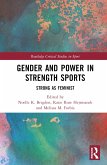Gender Performativity in Sports and Physical Education explores a perspective of gender called gender "performativity," coined by Judith Butler in the early 1990s. It starts from the idea that gender is something people do rather than something they are. Such a perspective offers new ways of understanding gender, and therefore also gender equity, in sports and physical education. It provides new ways to think about how inequitable practices can change. Empirical illustrations of gender performativity in sports and physical education are mainly drawn from Håkan Larsson's thirty-year research on the matter, but connections are also made to other research in the field.
Hinweis: Dieser Artikel kann nur an eine deutsche Lieferadresse ausgeliefert werden.
Hinweis: Dieser Artikel kann nur an eine deutsche Lieferadresse ausgeliefert werden.








